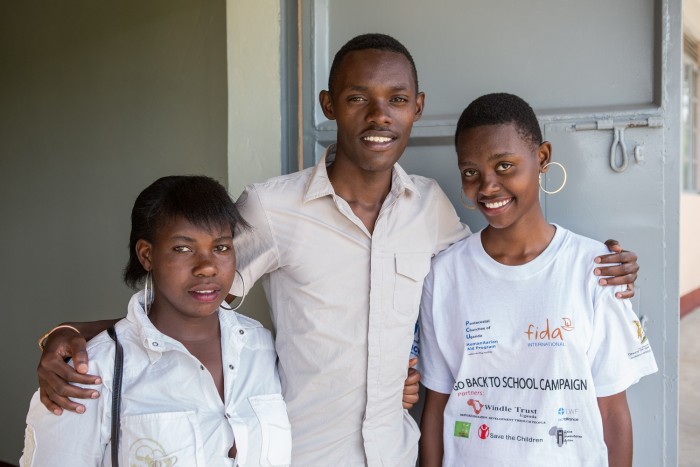
Louise Akimanimpaye (left), her cousins Elvis and Elodie Olibanji live in Rwamwanja refugee settlement in Western Uganda. ACT member, Finn Church Aid (FCA), together with two private companies, has started the implementation of an innovative project aiming at providing vocational training on entrepreneurship for the refugees. Vocational training is hard to come by in the area – the nearest vocational centre outside the settlement is 140 km away. Photo: Ville Räty, FCA
ACT members call for investment in resilience and reducing vulnerabilities through more flexible funding. We need to go beyond planning to meet humanitarian financial needs, to planning for humanitarian needs reduction, as stated by the UN Secretaty-General*.
While some of the issues currently undermining the humanitarian sector are structural, funding modalities have also shaped the current aid structure, including some of its shortcomings. As a result, a reform of the humanitarian system can’t be achieved without the fruitful contribution of major donor institutions. This contribution is presented under the idea of a ‘Grand Bargain’ by the UN Secretary-General, and it focuses on a trade-off between donors and humanitarian organisations. It aims at diversifying the resource base while involving the private sector more strongly in humanitarian assistance.
Previously, the modalities of engagement between humanitarian aid and development were clearly defined; however, the growing number of protracted crises, chronic disasters and long term displacement are challenging the ‘established order’.
Only by providing a holistic programme, including both humanitarian and development work, and also linking those with conflict prevention and peace building activities in conflict areas, we can hope to have a meaningful and lasting impact on the lives of affected people.
ACT Alliance member Finn Church Aid (FCA) is already working closely with the private sector to develop innovative approaches to long lasting issues. The involvement of the private sector in humanitarian programmes provides an opportunity to think outside the box and explore new ways of providing aid in an ever changing world. Beyond the financial opportunity, FCA believes a fruitful collaboration with the private sector can provide a portion of the much needed innovation required to reshape aid.
In times of diminishing Overseas Development Assistance (ODA), we request that the current refugee reception crisis impacting Europe shouldn’t be used as an excuse to reallocate ODA funding from other vulnerable countries toward Europe.
It is important that humanitarian actors will commit to creating programmes combining humanitarian aid, development and peace building in our focus countries, and to developing our activities around a shared vision of resilience. We should also commit to developing sustainable livelihoods, such as using cash programming as a favoured tool to provide in emergencies.
ACT members call for greater integration and investment in resilience and in reducing vulnerabilities through more flexible funding. It is also necessary to strengthen better coordination by the public sector to strengthen the participation of the private sector in humanitarian interventions.
___________
* UN Secretaty-General’s report: One humanity, Shared responsibility
CASE IN POINT: INNOVATION AND PRIVATE SECTOR RELATION IN THE RWAMWANJA REFUGEE CAMP IN UGANDA
The Ugandan government has a requirement of at least one vocational training centre in every county, but progress on this front has been slow and some counties are still missing such a centre. That is also the case in Rwamwanja, where FCA has started the implementation of an innovative project aiming at providing vocational training on entrepreneurship. Through the use of mobile technologies, private companies from Finland (Omnia and Fuzu) are able to provide skills training to Congolese refugees using mobile phones. Different modules on business and entrepreneurship, developed by Omnia, are provided to students through the mobile application developed by Fuzu, with support from FCA staff on the ground. If successful, this initiative will be scaled up to reach both refugees and local young businessmen.
___________
 Eija Alajarva is Head of Humanitarian Assistance at Finn Church Aid (FCA). She has a long working history at FCA, in both development cooperation and humanitarian assistance, including deployments in FCA program countries.
Eija Alajarva is Head of Humanitarian Assistance at Finn Church Aid (FCA). She has a long working history at FCA, in both development cooperation and humanitarian assistance, including deployments in FCA program countries.